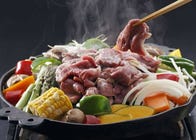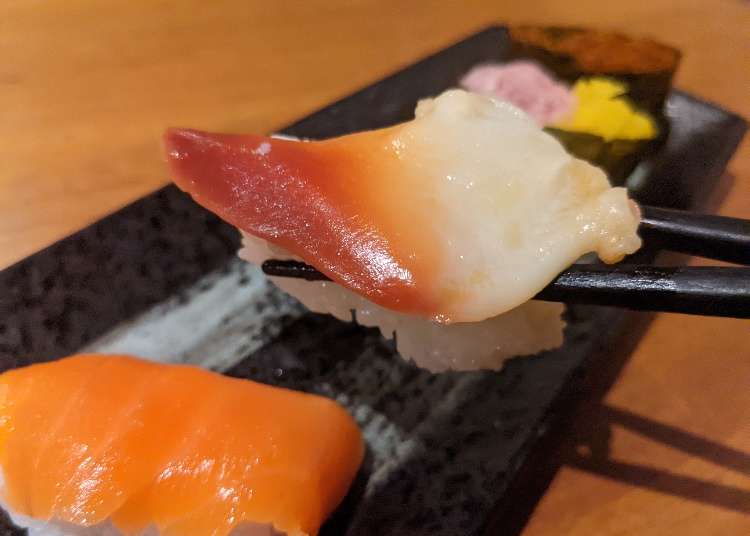
Hokkaido, Japan's northernmost region, is one of the country's leading areas for seafood. So it makes sense that it's a famous region to go for fresh and delicious sushi at affordable prices.
If you want to "Eat delicious Hokkaido sushi until you're full to bursting," Uoppshu Sapporo store is a restaurant where you can do just that. Here, we'll look at some of the fantastic dishes Uoppshu has to offer.
We'll be going through all the recommended dishes you can't miss from their wide variety of fish and sake on their all-you-can-eat menu!
Uoppshu: Seasonal fish for reasonable prices
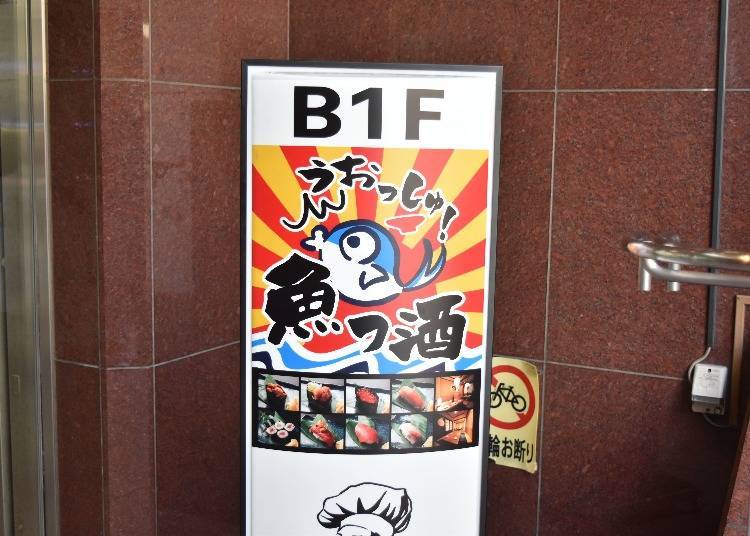
Uoppshu is located on the first basement floor of the NC Kita Sen Kita 3 Jonishi Building, which is a 3-minute walk from JR Sapporo Station and a 1-minute walk from Sapporo Subway Station Exit 24.
Outside the building's entrance is this fish sign (above), so you can use it as a landmark when looking for the restaurant.
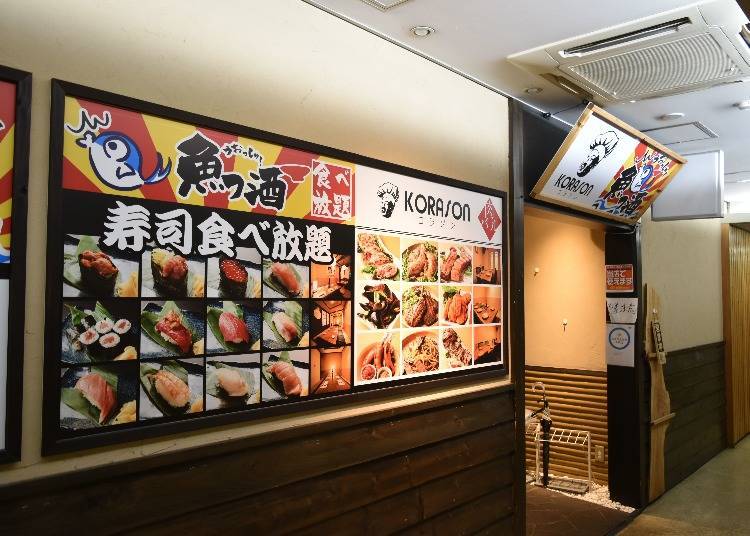
There are a lot of sushi restaurants in Sapporo, but not many all-you-can-eat spots. Bringing in seasonal fish from the harbors, Uoppshu is one of the few places where you can still get fish at affordable prices.
Here, sushi is a given, but you can also get fish arranged in various ways, such as in the form of sashimi, "nitsuke" (boiled in soy sauce), stir-fries, and fried.
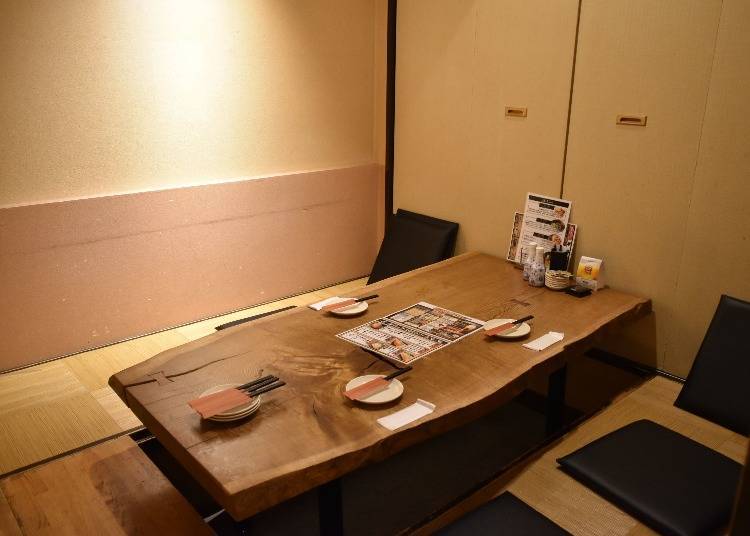
In addition to the regular table seating, there is also a private room that can accommodate 4-5 people. You can enjoy your meal without worrying about your surroundings in an intimate space.
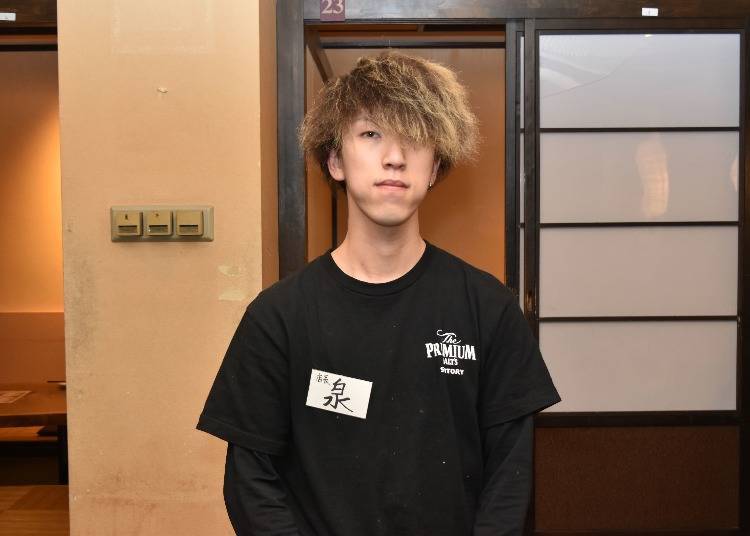
We asked the Uoppshu manager, Daichi Izumi, to tell us about the special characteristics of the restaurant:
"Our restaurant is mainly all-you-can-eat and drink, and we have a wide range of dishes such as traditional Japanese food, seafood, meat dishes, and hotpot dishes.
"We have several different all-you-can-eat and drink plans, and what you get varies depending on the day of the week, the time you enter the restaurant, and the current pricing.
"First, you'll be given five plates of sushi decided by the chefs (this is called 'omakase'), after which you can order in plates of 5 provided you leave no leftovers.
"The seating time for all-you-can-eat is 120 minutes, but the last order for food is 45 minutes before the end, and the last order for drinks is 30 minutes before the end.
"The all-you-can-drink menu has a variety of drinks, such as soft drinks, sake, wine, and cocktails. We have a lot of different types of sushi so that anyone can enjoy them."
Eat everything on the menu!
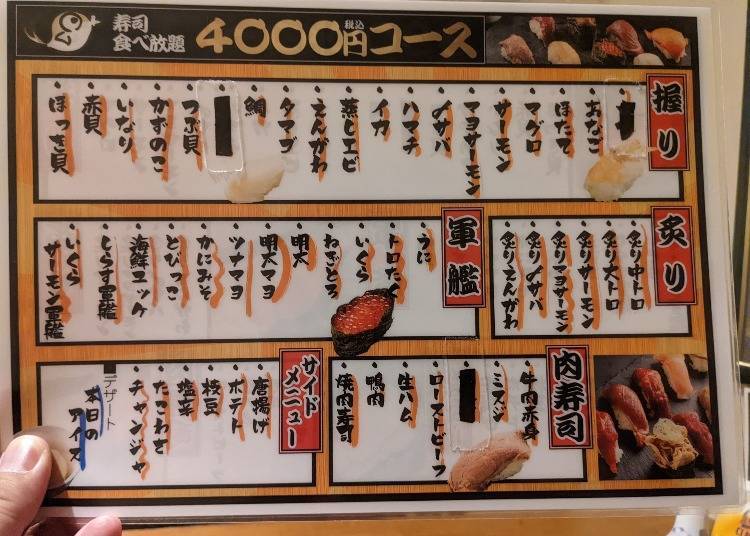
When I visited, I took on the all-you-can-eat and drink course for 3,700 yen, allowing you to eat the most sushi.
There is no English at the restaurant or on the menu, so take a look at our pictures and information below when ordering. Also, please note that some items may not be available due to various factors like stock intake.
If you can write the Japanese fish names in hiragana (or kanji for the pros), then fill out the slip on the table with the sushi you want to order and call the staff with the bell to hand them the slip.
If you can't write in Japanese, then call the staff with the bell, and tell the staff the following: "Kakemasen. Kotoba de iimasu." (I cannot write. I will say my order.)
Or, if you want to be more polite:
"Kakemasen kara, kotoba de itte mo ii desu ka?" (I can't write, so is it OK if I tell you my order?)
Then use the pictures below in this article to choose your fish. We've written the Japanese pronunciations first, with the English translations in brackets.
Manager recommendations for beginners
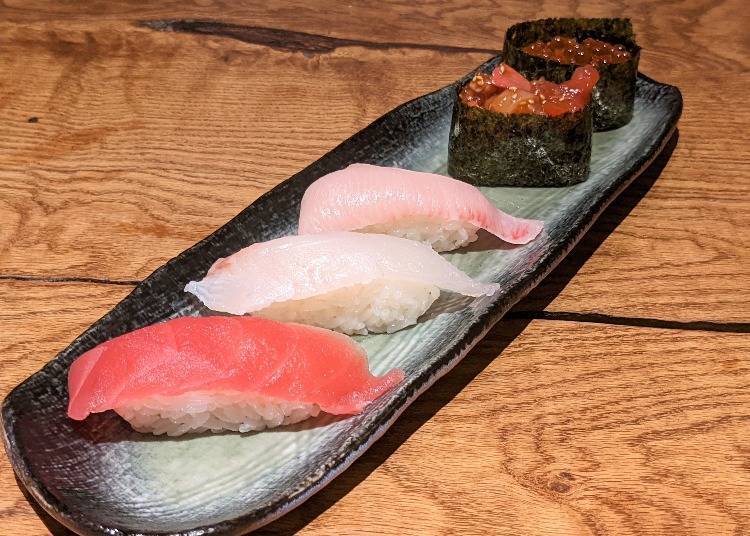
Izumi gave us his five recommendations.
"As a beginner selection, how about the sushi staple, maguro (tuna), and the inoffensive hamachi (young yellowtail), followed by two dishes we season ourselves, kaisen yukke (seafood with raw egg), ikura (salmon roe)."
Each and every one is delicious and high quality. In particular, Maguro (tuna) and ikura (salmon roe) are highly valued delicacies. The toppings are fresh, and the rice is well vinegared, so you'll be stuffing your mouth with one after the other. I emptied my plate in no time.
Once you've finished your initial five dishes, you can order five more. Each piece is a good size, so you can try out many different varieties. Every dish comes without wasabi, so add wasabi to your liking from the table.
For the Japan foodies
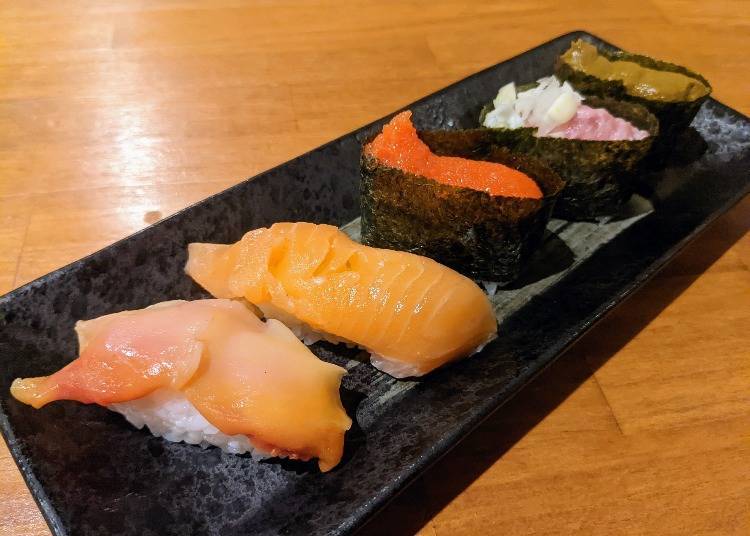
For my second plate, I ordered akagai (blood clam), saamon (salmon), mentai (pollack roe), negitoro (tuna and spring onion), Kani miso (crab brown meat).
The "mentai" is made with walleye pollack fish eggs with a spicy seasoning. The "Kani miso" is a delicacy made from the brown meat of a crab on the inside of the shell. If you like these two dishes, you must be a seasoned foodie with Japanese cuisine.
Generally, sushi connoisseurs will say it is best to start with mild flavors like that of white fish, then move on to bolder flavors. But with all-you-can-eat sushi, "eat what you want until you're full" is the only thought you have to worry about!
If you're not used to sushi, just start from one end of the menu and work your way in, and find out what you like.
Four unique sushi dishes
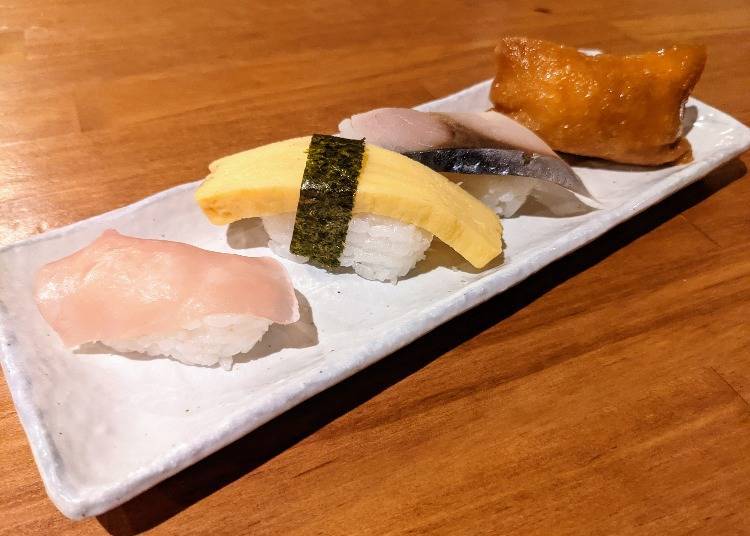
For my third plate, I decided to change it up and go for something a little more unusual.
Recently, "niku sushi" (meat sushi) has been gaining popularity, and one of the dishes you might come across is sushi with dry-cured ham in place of fish.
As for the egg sushi, this is pretty normal at sushi restaurants, but no one knows precisely why. Some say it is because cooking the egg tests the chef's abilities, but no one knows for sure.
Mackerel can lose its freshness quite quickly, so by pickling it with vinegar to make "shime saba," you allow it to stay tasty for longer.
"Inari" is a type of sushi where you wrap vinegared rice in a sweet sheet of twice-fried tofu. (The fried tofu sheet is called abura-age). It has a sweet and savory taste.
Each one offers quite a refreshing change of pace, so if you want to switch things up, these are some excellent options.
Creative sushi with mayonnaise (it's better than you think!)
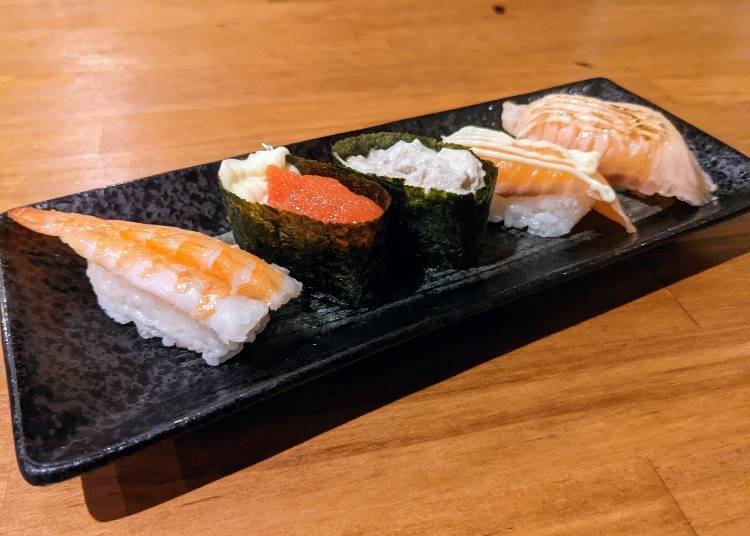
Their selection of mayo dishes creatively combines flavors that are pretty unique to Japan. Vinegar is used in the mayonnaise and in the sushi rice, so they go surprisingly well. If you're new to sushi, you might want to try one of these at the start.
Luxurious sushi options
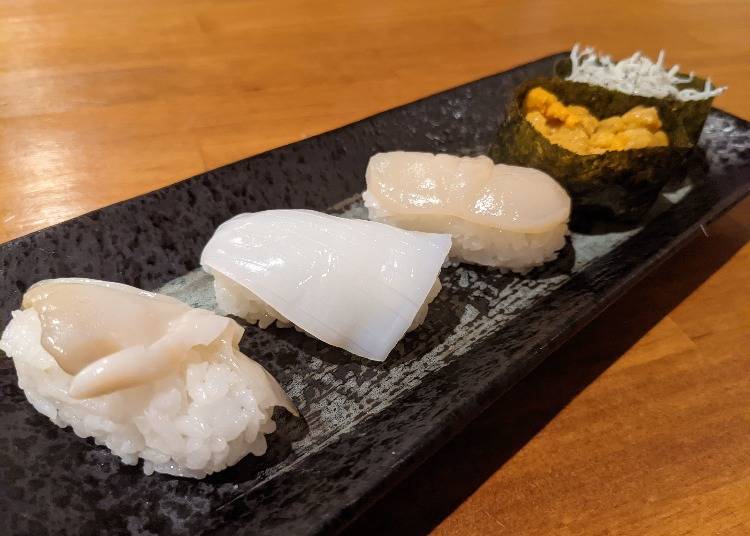
For my next plate, I chose some more luxurious options. Uni (sea urchins) are very popular, but they are getting harder to catch with the rising sea temperature. The rich fragrance is intoxicating!
All the dishes were of superb quality, like the firmness of the tsubu gai (whelk), the chew of the ika (squid), the sweetness of the hotate (scallops), and the fresh vibrance of the uni (sea urchin). Having these offered to you on an all-you-can-eat menu is a fantastic feeling.
We're not done yet! Great lineup of meat sushi
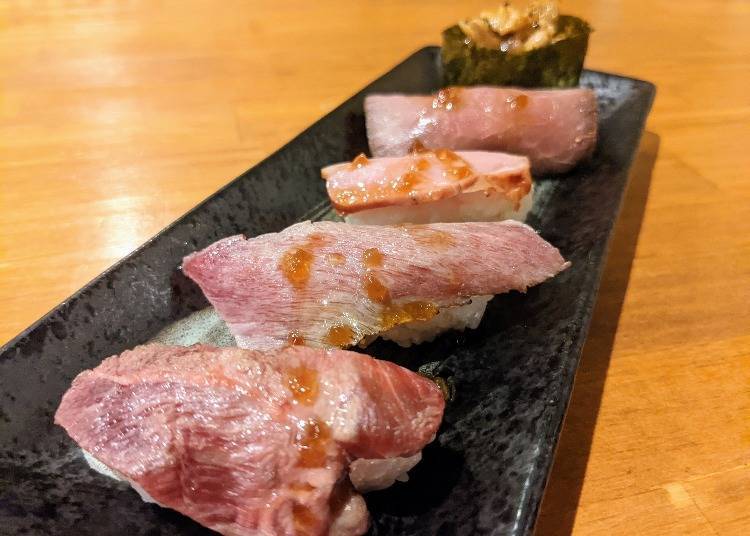
There is also a wide variety of meat sushi, which I think is another great way to change things up. One of the unique characteristics of Uoppshu is that they have exciting varieties of sushi you might not usually come across, like beef and duck.
In case you're wondering, the word "misuji" comes from the three (mi) tendons (suji) surrounding the meat. Per cow, you can only get 2kg of this kind of meat, so being able to eat it as sushi is quite the luxury!
Recommendations from a local writer
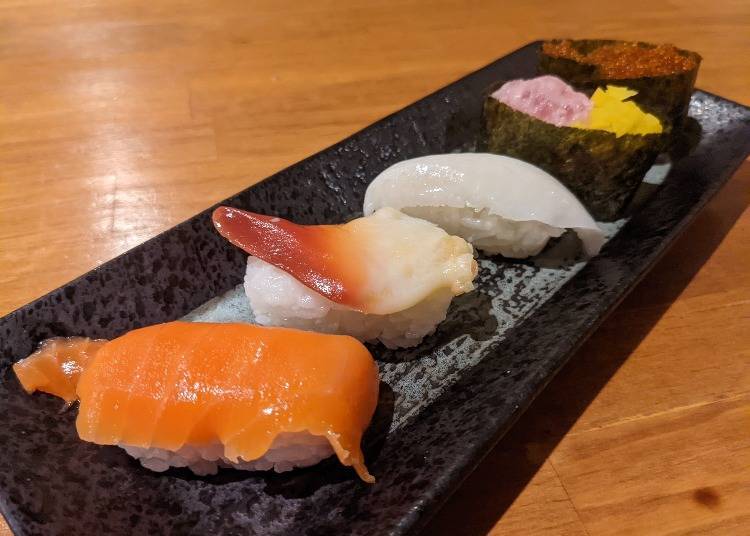
The time came for me to make my last order, so this is what I chose to end the meal with. For your final plate, you can either decide to taste one of your favorites again, or challenge yourself to ones you don't know. The choice is up to you!
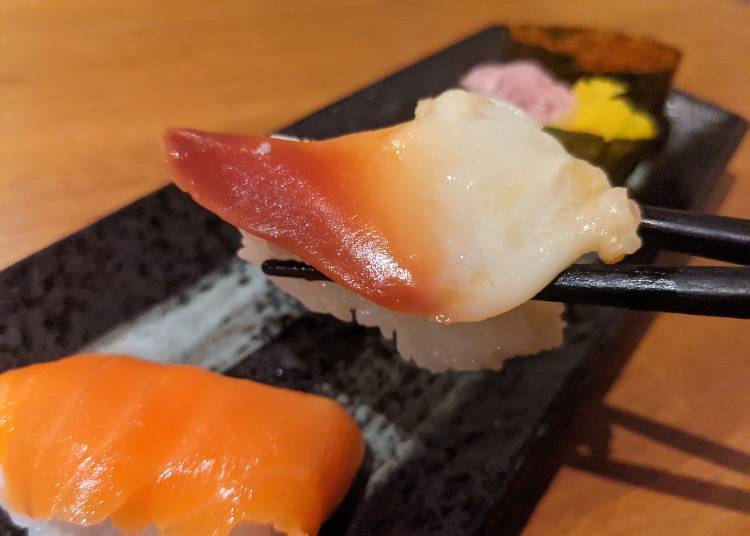
As a Hokkaido local, I strongly recommend "hokkigai," the Sakhalin surf clam. It has a toothsome quality, and as you bite into it, the sweetness washes over your mouth.
It is also known to be rich in minerals like calcium and magnesium, so it may even help you recover from the fatigue of traveling. Please give it a go as one of your all-you-can-eat dishes.
Every one of the dishes on Uoppshu's all-you-can-eat menu was so delicious that even though my stomach was full, my mouth was asking me to eat more!
Seeing as sushi elsewhere can be quite expensive, if you want to eat a lot of delicious Hokkaido sushi, an all-you-can-eat place is definitely the way to go! If you're in Sapporo, make sure you don't miss it.
Multilingual Support
None
-
Uoppshu Sapporo store魚っ酒 札幌店
- Address NC Hokusen Kitasanjo Building B1, 2-1-13 Kita 3-jo Nishi, Chuo-ku, Sapporo, Hokkaido 060-0003
- Phone Number 050-5452-1176
・Hours:
Monday-Friday, and before public holidays: 4:00 p.m. - midnight (Last order: Food 11:00 p.m., Drinks 11:30 p.m.)
Saturdays, Sundays and public holidays: Noon - midnight (Last order: Food 11:00 p.m., Drinks 11:30 p.m.)
・Closed: Open daily
Original Japanese text by: Masakazu
Translated by: Cassandra Lord
*This article was originally published in June 2022 and prices confirmed in August 2023. Please check the official website for the latest information.
- Area
- Category
*Prices and options mentioned are subject to change.
*Unless stated otherwise, all prices include tax.
Popular Tours & Activitiess
Recommended places for you
-

Sapporo Clock Tower
Landmarks
Sapporo / Chitose
-

Nakamura
Sushi
Sapporo / Chitose
-
Appealing

Rukku and Uohei
Izakaya
Sapporo / Chitose
-

Kinyotei
Sushi
Sapporo / Chitose
-
Appealing

Shirogane Blue Pond (Aoiike)
Rivers, Lakes & Canyons
Furano / Biei / Sounkyo
-
Appealing

Otaru Canal
Rivers, Lakes & Canyons
Otaru
-
Ad

Sapporo SATUDORA Shopping Guide: Get Souvenirs, Medicine & More at This Iconic Drugstore (Special Deal Inside!)
-

Explore Japan in 7 Days: The Ultimate Local Rail Adventure with the Hokkaido & East Japan Pass
by: Guest Contributor
-

Expert-Recommended: 9 Hakodate Hotels Serving Up the Best Breakfasts in Town
by: Nobuka Kawashima
-

BIGGEST SALE ALERT! SATUDORA Tax-Free Winter Sale: Stack Coupons for Massive Savings!
by: Guest Contributor
-
Ad

Welcome to Sapporo! Here’s How to Expore the Ciy Like a Local
-
Ad

Smart Ways to Avoid Crowds and Enjoy a Safe, Comfortable Trip to Noboribetsu Onsen
-

Ultimate Tokyo Transit Guide: JR, Subways, and Private Railways Explained, Plus Suica/PASMO and Money-Saving Passes
-

12 Vegetarian & Vegan Sushi Rolls You'll Want to Try
-

Nemuro Hanamaru: Hokkaido’s Quality Conveyor Belt Sushi That Won’t Break the Bank
-

Family-Friendly Dining: 5 Must-Try Seafood Restaurants in Hokkaido
by: Nobuka Kawashima
-

Hokkaido Lavender Fields: 6 Best Places in Furano to See Japan's Dreamiest Purple Meadows
by: Nobuka Kawashima
-

Noboribetsu Onsen: 5 Best Things to Do in Japan's Famous Hot Springs Town!
- #best sushi hokkaido
- #things to do hokkaido
- #best ramen sapporo
- #what to bring to japan
- #new years in tokyo
- #what to buy in ameyoko
- #japanese nail trends
- #what to do in odaiba
- #onsen tattoo friendly tokyo
- #daiso
- #best sweets otaru
- #japanese fashion culture
- #best nature furano
- #japanese convenience store snacks
- #best japanese soft drinks













